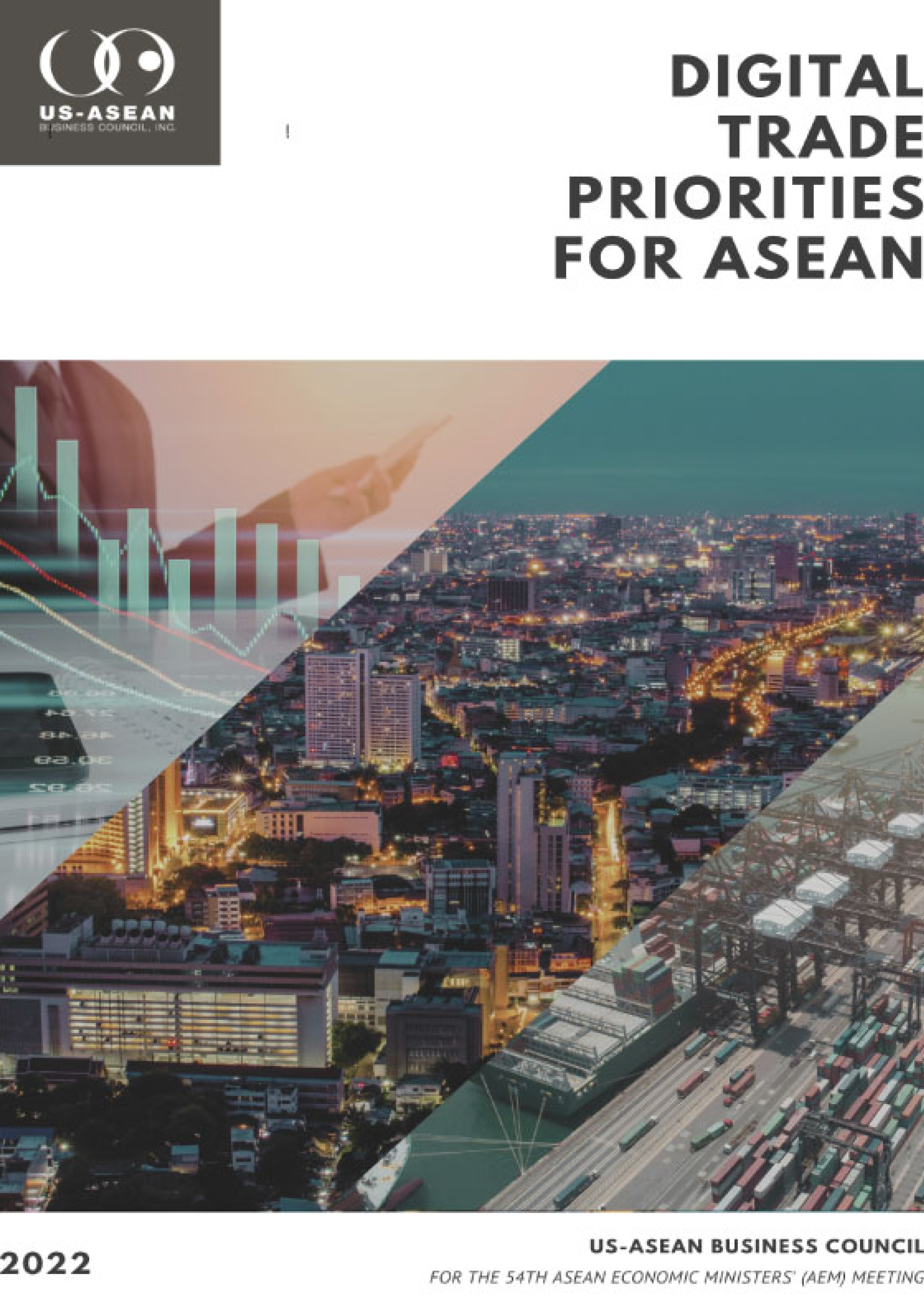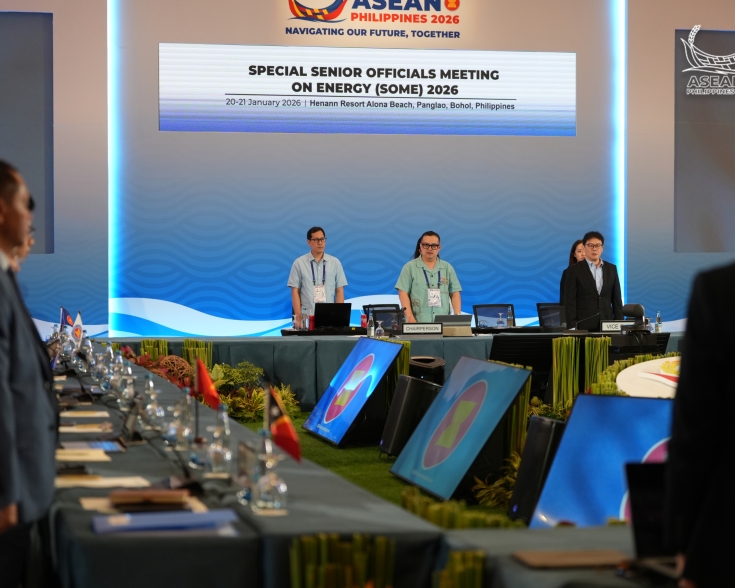
Digitalization is fundamentally transforming every sector of the global economy, making a robust digital
economy increasingly the driving force for post-pandemic economic recovery and growth. In this
connection, trade has become increasingly digitally driven and digitally delivered, including in ASEAN.
Digital trade will drive the next phase of ASEAN’s economic growth
These trends are readily apparent in ASEAN: the region has seen 40 million new Internet users come
online in 2021 alone, and its digital economy is projected to grow to US$1 trillion by 2030.1 Digitalization
is set to stay for the long haul and has become a way of life in ASEAN. 90% of new digital services users
in 2020 continue to use these services in 2021.2 Digital trade will drive the next phase of ASEAN’s
economic growth, as more people in the region participate in the digital economy and engage in cross-border
digital transactions.
Digital trade helps to promote inclusive growth
Inclusivity has emerged as an important consideration in trade policy globally, and digital trade can help
make trade more inclusive within ASEAN. Internet-enabled trade has brought unprecedented
opportunities for traditionally marginalized communities such as micro, small, and medium sized
enterprises (MSMEs), women, minorities, rural communities etc. to participate in global markets. Ecommerce,
for instance, greatly expands opportunities for MSMEs to participate in international trade. On average, the World Trade Organization (WTO) reports that 97% of Internet-enabled MSMEs export, in contrast to between 2% to 28% for traditional MSMEs in most countries.3
ASEAN Digital Economy Framework Agreement (DEFA): an opportunity to build an enabling framework for ASEAN digital trade to flourish
A forward-looking digital trade agenda is needed for ASEAN Member States (AMS) to capture the
benefits of these developments and to engender trust and confidence in the digital economy amongst
all of its stakeholders. The US-ASEAN Business Council (US-ABC) welcomes the ASEAN Economic
Ministers’ (AEM) September 2021 announcement to begin defining DEFA by 2023 and to commence
negotiations by 2025. The DEFA would no doubt form the foundation for ASEAN’s digital trade and
economic integration and its importance cannot be understated.
For the DEFA to maximize ASEAN’s digital trade potential, it will be important for the framework to be
responsive to the end user, which in this case, is the business community who are engaged in the day-to-day-
day digital trade transactions and interactions in the market. In this regard, we would like to humbly
offer some suggestions on the overall framing of DEFA as well as the important issues to include from
the business perspective:
● Consider accelerating the negotiating timelines. Given the rapid pace of developments in the
digital economy, we urge ASEAN to consider accelerating the negotiating timelines for DEFA so that the rules and norms can be relevant and helpful to businesses on the ground, and to
accelerate the growth of the regional digital economy. There is already a body of work involving
AMS that ASEAN can draw from – for instance the Regional Comprehensive Economic
Partnership’s (RCEP) E-Commerce Chapter, ASEAN Agreement on Electronic Commerce, the
Digital Economy Partnership Agreement (DEPA) and Singapore’s Digital Economy Agreements.
● Take reference from existing commercially meaningful digital agreements. The U.S.-Japan Digital
Trade Agreement and the U.S., Mexico and Canada Free Trade Agreement (USMCA) establish
commercially meaningful rules of the road for the digital economy, which U.S. industry broadly
supports. Additionally, Singapore’s Digital Economy Agreement with Australia (SADEA), its Digital
Economy Agreements with the United Kingdom (UKSDEA), with Korea (KSDPA) and DEPA with
New Zealand and Chile, all include strong commitments that promote best practices in digital
trade. We encourage ASEAN to look into the provisions in these agreements as good references
as it works towards negotiating a commercially meaningful DEFA which would help grow
ASEAN’s digital economy.
● As far as possible, ensure that commitments are binding and commercially meaningful. Such
commitments will be necessary if ASEAN were to fully realize the potential benefits of digital
transformation, as they will give confidence and certainty to businesses investing and operating
in the region. Binding commitments, with recourse to robust dispute settlement mechanisms,
will give investors – both foreign and domestic – more confidence and certainty to invest and
engage in ASEAN’s digital economy.
● Build in flexibility to accommodate different levels of development but work towards the same
end goal. The U.S. industry fully appreciates the differing levels of development within ASEAN
which would necessitate some measure of flexibility in the way DEFA is designed. Flexible
architectures such as a modular approach could be helpful in this regard. However, for ASEAN to
fully seize the digital trade opportunity, it is important that all AMS are pulling in the same
direction and working towards the same end goal. As such, concrete, demonstrative projects
that are tied to the provisions of the DEFA which encourage interoperability between AMS could
help in fostering such alignment.
● Stakeholder consultation and engagement will be critical to ensure that DEFA is relevant and
responsive. With the rapid digital and technological progress, it is essential that robust
stakeholder consultation be carried out as ASEAN formulates and negotiates DEFA. ASEAN
should also seek to establish a formal mechanism with other players on the forefront of digital
trade, including the U.S. government and U.S. private sector, to consult on how the provisions
and principles of the agreements that either party has started, ratified or plan to begin, could fit
into broad plurilateral, regional or even global conversations on a digital trade agreement.
The white paper elaborates a number of digital trade enablers that the US-ABC would like to submit to
the AEM and relevant sectoral bodies for consideration in developing DEFA. The Council hopes to
discuss this further and work closely with the relevant ASEAN Sectoral Bodies in the process of
developing DEFA.



